
13th December – 2nd February
The bright morning haze threw off the dark bedsheets of the night to reveal a tiny tropical island bursting with butterflies and flowers. To the left was a sharp reef with rolling waves equipt with surfers. In contrast the dusty city, with its layers of concrete blocks an unpainted grey, glassless windows looking like wide eyes out towards the sea. Their monochrome nature gave way to the fantastic colours of the hand painted signs to shops, clothes and head-scarfs and fruit piled up on corners. High above all this as though monitoring the goings-on below, a hundred huge birds of prey circling and circling.
Narrow wooden highly decorated boats with fishermen and fisherchildren belonged to these waters, and in turn it belonged to them. It seemed every family had a fisherman or two to nourish them, without him, many people would just be eating rice since vegetables were sometimes more expensive than Europe, even on the markets. Sometimes a huge colourful wooden pirogue would arrive and be driven right to the shore. Many men and women would unload food and clothes and we assumed fish, after long trips fishing and selling them along the west African coast to bring the money home. Work or mostly the lack of was big topic of conversation for many people.
Samba approached first. His boat, peeling a little paint and leaking a little water was the perfect size for one man and several large fish which he would try to sell us or just show us, it was never quite clear. Adama was the second man, who drove the boat for the French-run surf school on the island, taking advantage of those curling waves so close.
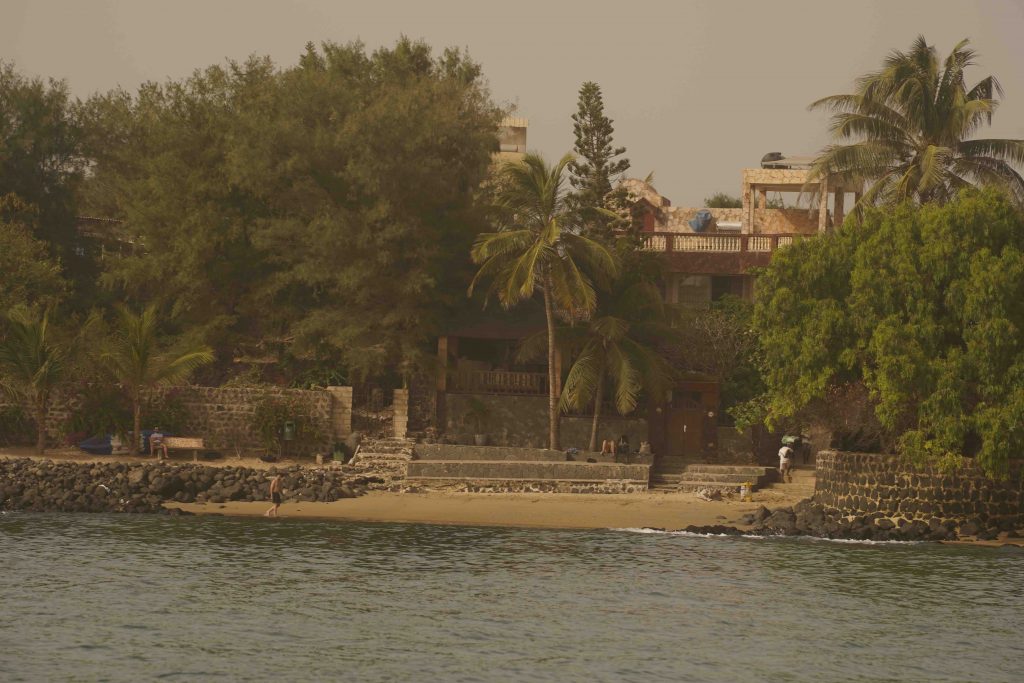
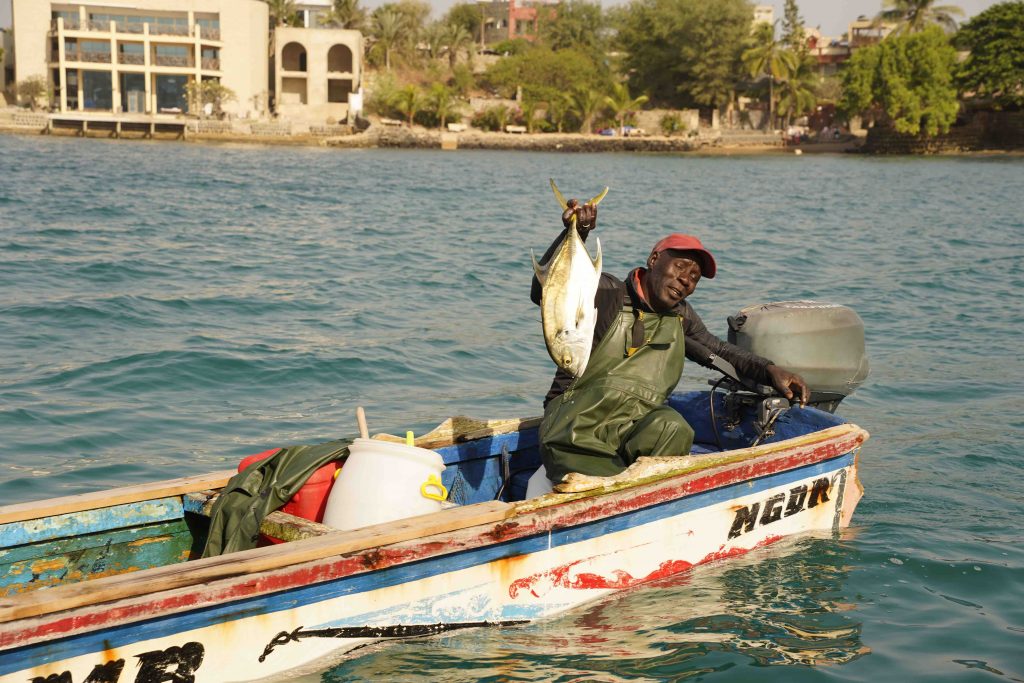
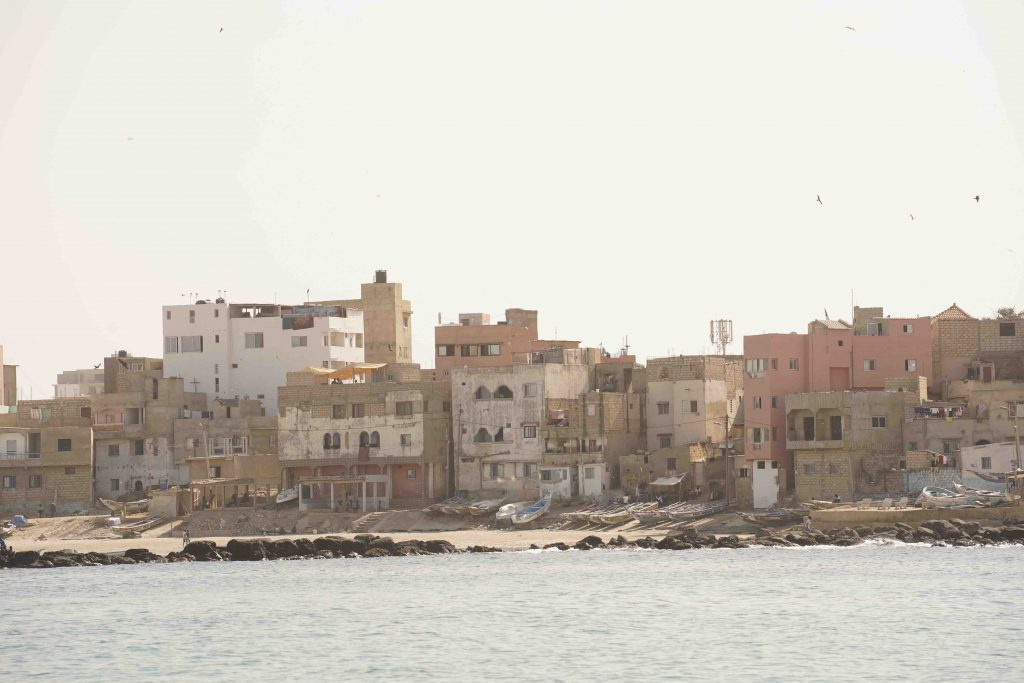
If we hadn’t met Adama, our experience of Dakar wouldn’t have been half as fun.
That first day we wanted to sort out immigration and it was Adamas friends who photocopied all our papers and passports, for free, and then proceeded to share their lunch with us. A hot tray of spiced rice with yam and fish. This was the first but absolutely not the last shared meal, and the generosity of strangers enveloped us.
Just before we left Tenerife I was waiting on my own at a bus stop with the hugest amount of food shopping while Niels went to the pharmacy. A Senegalese guy came and sat next to me on the curb. Although sharing next to no common language, he gave me his coat and a handful of cashew nuts. We smoked, he sang me a song in Wolof, and went on his way.
After a fast drive through the city with a driver who had a sling shot on his dashboard next to pile of shells (i didn’t ask questions) and made it his mission to scare all the cyclists into never going on the road again, we got to the police station. They were watching football and not at all interested in us checking in. They asked Niels which football team; Paris or Marseilles, and after clearly choosing the wrong one it was obvious that we should leave. Come back on Monday. This was a waste of taxi money so we thought we’d try taking the bus home.
En route we found ourselves being dragged enthusiastically to a shop by an old man with a tracheostomy tube who was whispering to us in German. He chose the wrong tourists because the shop owner wanted 100 euros for a shirt and a pair of trousers, and only got 20. Our ‘Guide’ didn’t get his commission and we were disappointed that he now also wanted money. We didn’t want to go to a shop to get ripped off in the first place. In the end, he got and avocado and two passion fruits which I bitterly missed on the way home. The bus was like nothing Niels or I had ever experienced before. There must have been 50 of us packed into the minibus falling onto our neighbours as we lurched along the crowded streets.
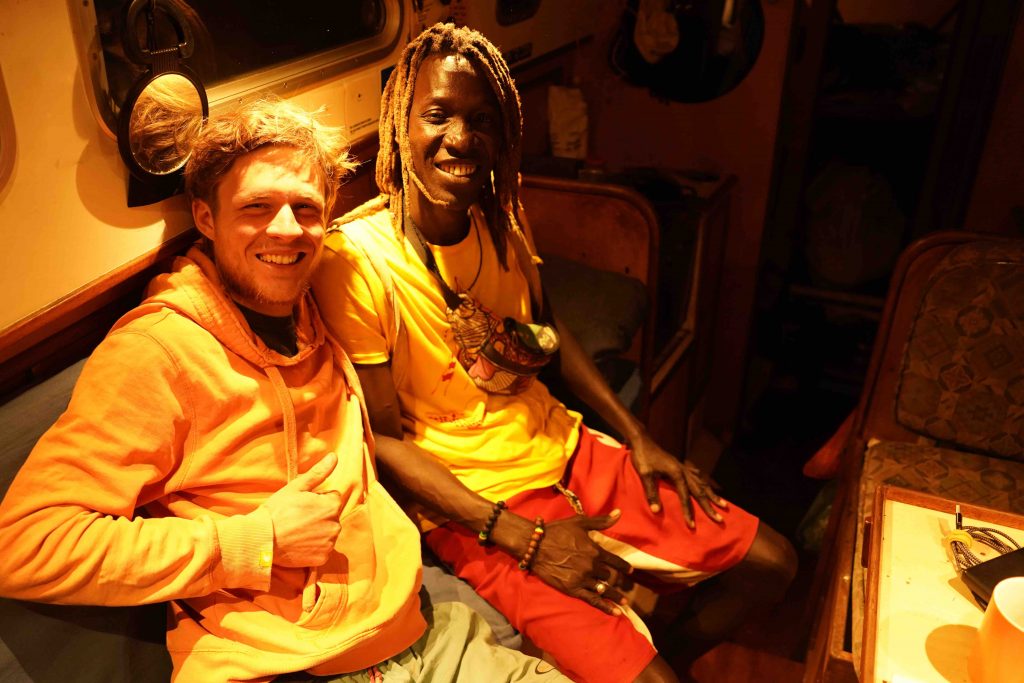
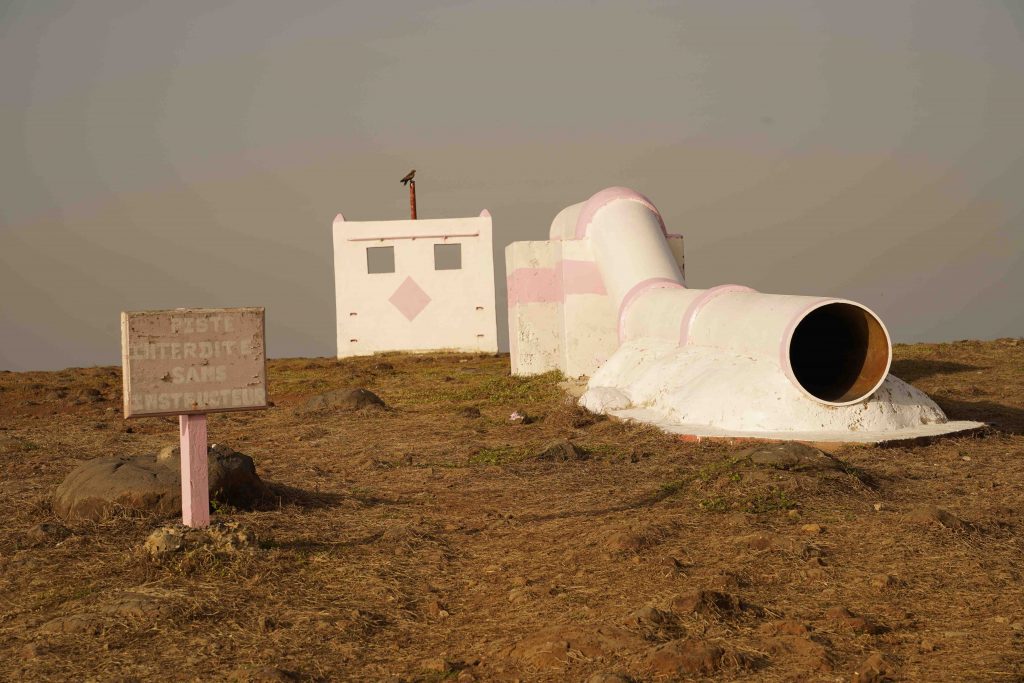
I wish there was a way to capture the feeling- of when you experience somewhere for the first time. The sandy alleys full of sheep with horns, children chasing after us, the grandma roasting peanuts, the flashy phone shop full of young men in fake Addidadas, babies tied on backs with a single colourful cloth, the pink painted tailors shop with men sewing throughout the night, the smell of food we’ve never tried and the shapes of vegetables I can’t name.
Ngor isand is only a kilometer long, and has narrow little pathways weaving between small houses, hotels and stands selling food and trinkets. A 1/4th of the island is military and inaccessible, and has its own boat landing and assault course. Adama hads a sandy spot to the left under a flowering tree where he lays out the rugs that weren’t currently being lent out to tourist for a voluntary fee. The ritual of tea making could take 20-30 minutes, and that wasn’t including the time it took to heat the water. The little kettle was filled with water from an old bleach bottle, and then nestled the coals in the fire bowl. A tiny packet of green tea would be produced, and half mixed with the water. 6 tiny glasses were then filled halfway with sugar. Tea would be added to one of them, and then poured back and forth, the glasses being elevated higher and higher. This was repeated until each had a head of foam and were subsequently passed around. We were told that if you wanted to marry a girl, you couldn’t spill a drop while serving her parents. The others drank them quickly and returned the vessels to be rinsed and refilled for those who weren’t in the first round. It was incredibly hot and sweet, but delicious.
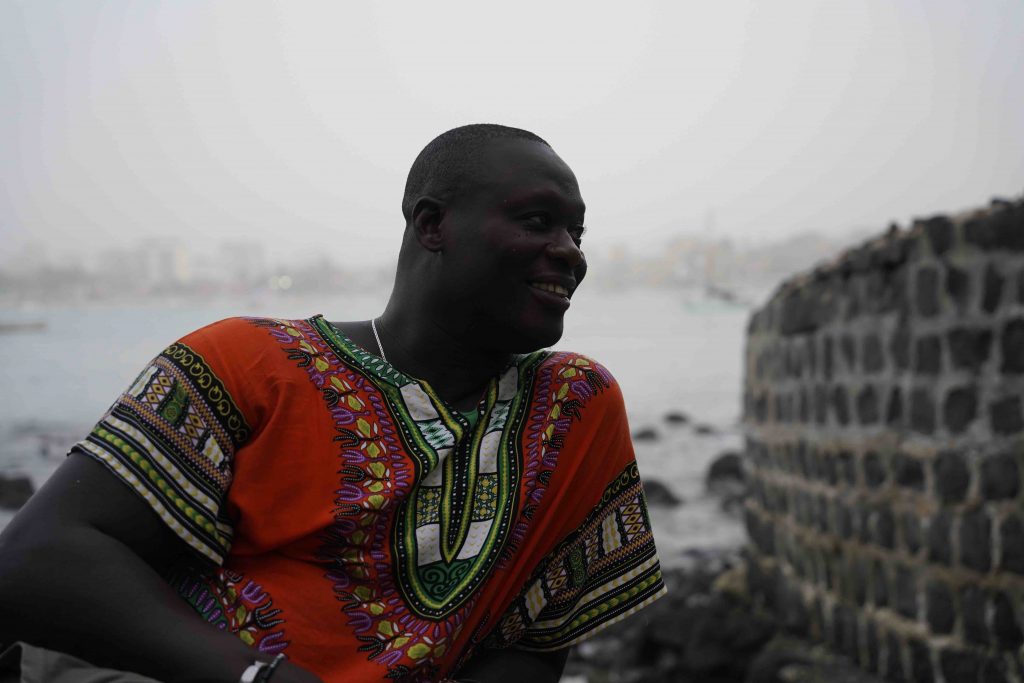
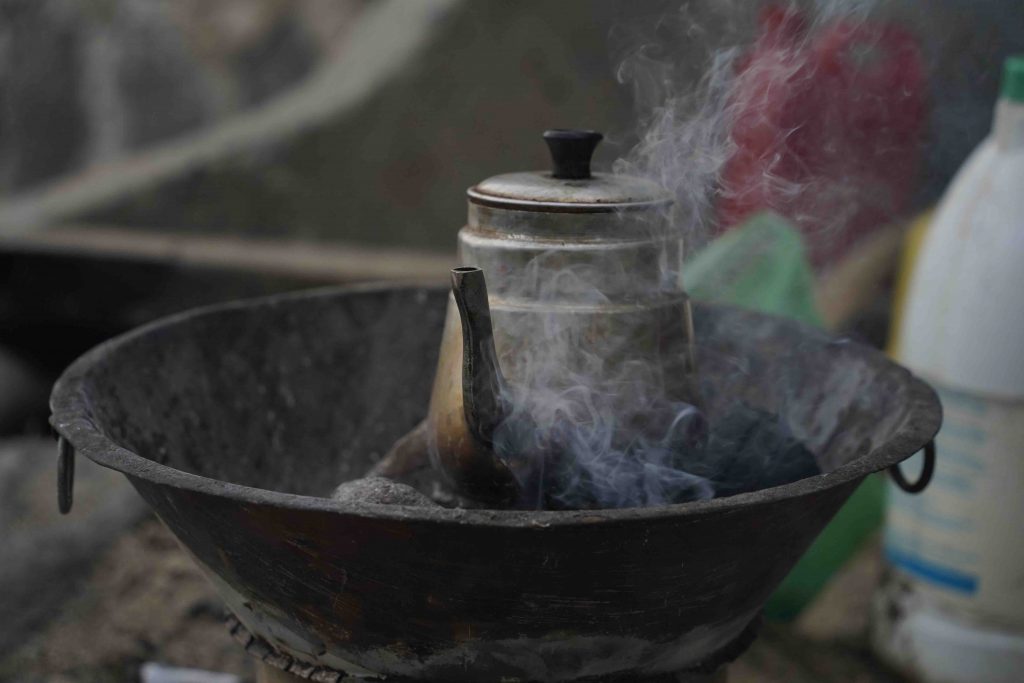
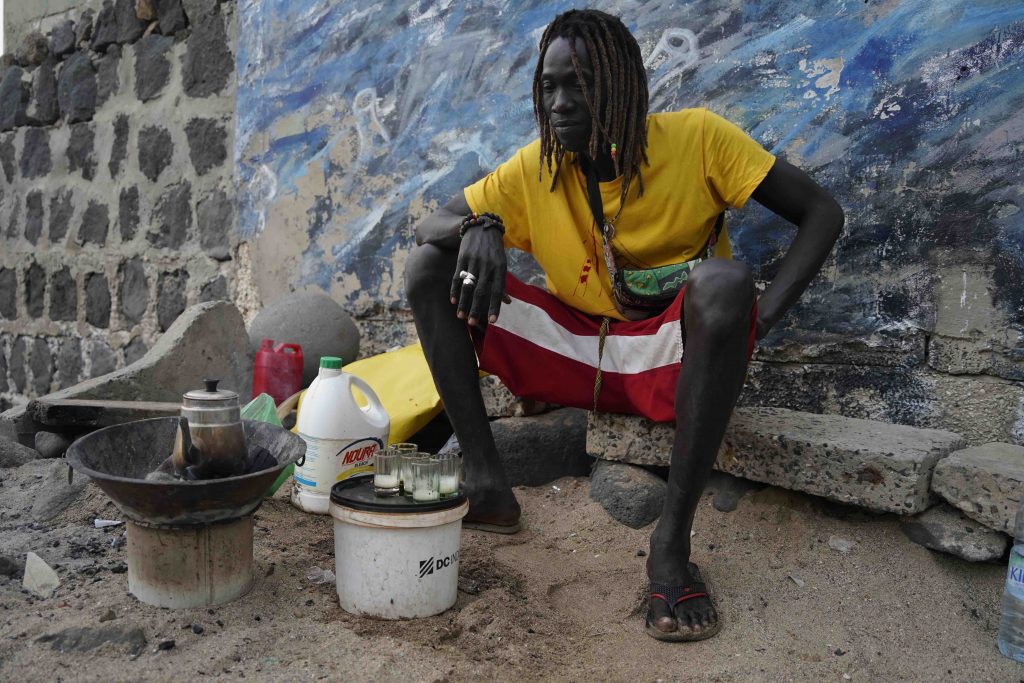
What was less delicious were small plastic bags filled with a ground kind of rice pudding, and these were generously donated by some of the young men who hung around the little fire all day, sometimes wrestling, sometimes playing a bat and ball game, but mostly just sat around. They didn’t drink alcohol or smoke and asked often of Europe, and were there many jobs there? I couldn’t imagine these kind young men being faced with the cold nature of the streets of London or Berlin or Barcelona. Here, I had the feeling that people looked out for their neighbours. I knew families who always cook an extra portion of food in case somebody came by who was hungry. When we needed something someone would help us find it, if we were hungry we were fed, for free. I feel a wave of guilt at the thought of them making the perilous journey to Europe only to be ignored and treated like dirt because of our lost sense of community and rotten politics.
On Monday we checked in and went to customs where we had to pay €40 for being Senegalese waters for the month. The office was like nothing I had ever experienced. A deep sandy track branched off a busy road, and either side were huge piles of interesting massive metal. It looked like pieces of cranes and pipes and lorrys.
There was no sign, just an open doorless doorway into a dark empty room except for a small table with a radio playing loud music. The room lead into a courtyard with lines of washing hung out to dry.
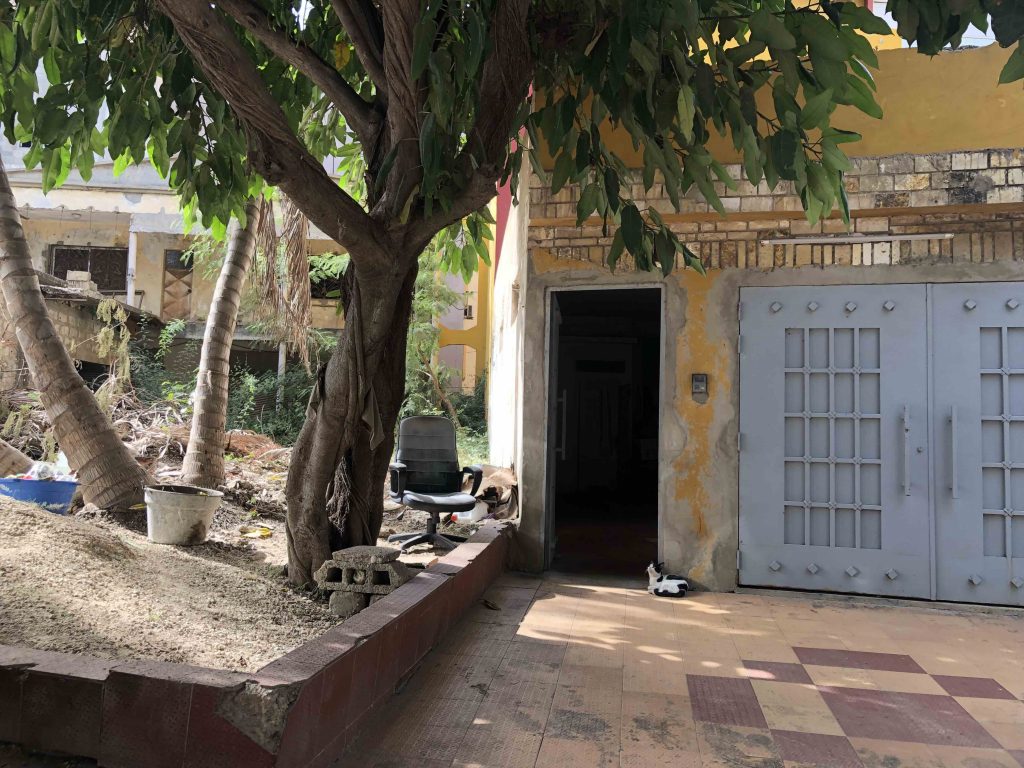
At the end of the room was a stairway, and IF you went up 4 flights of stairs, there was a sign on the door to the right letting you know you were in the right place. On our way home Niels couldn’t help himself, and bought a huge 15 kilo shackle from one of the heaps.
Otto also arrived on Monday and we met the following day with him and his family for a beer. He had the mission of replacing an important part of the gearbox that was leaking oil under pressure. I was not interested in another city mission, and so, Niels being able to talk French, went with him going from workshop to workshop to back alley to factory to find the bloody thing. Which they did, kind of.
It was a metal turning workshop in the end that made him one for free.
That happened to be the day that I woke up on the boat to find that Dakar had disappeared. Everything was hidden under sepia mist and I could barely even make out the island behind me. This photo was the following day as it cleared up.
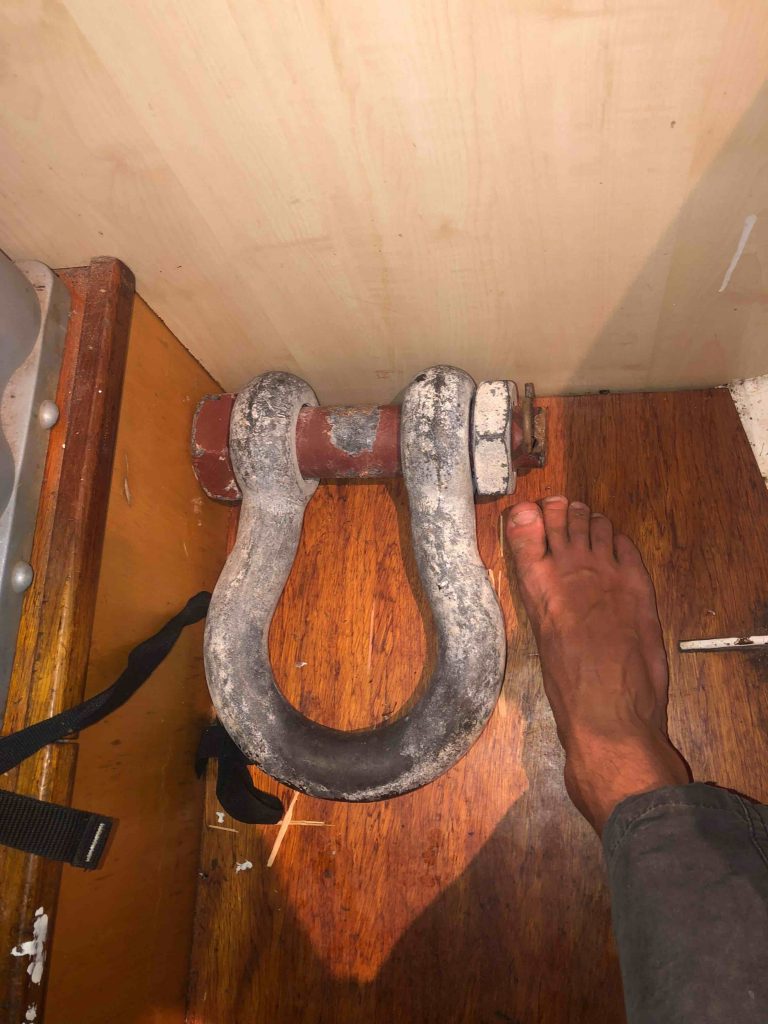
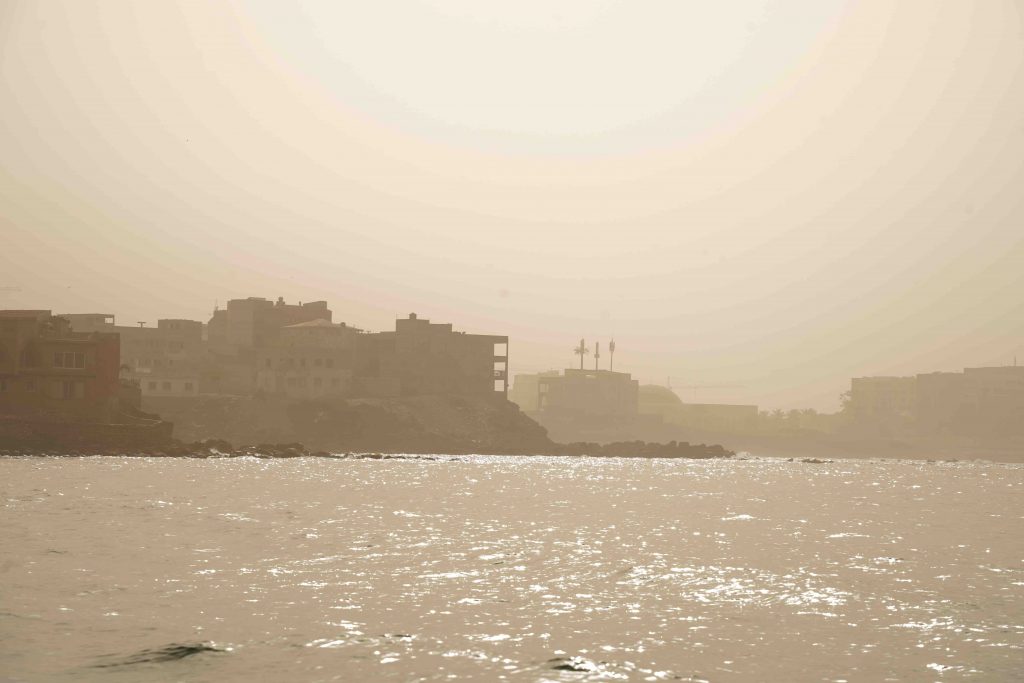
All day the air was dirty and heavy, and I had no idea why. Only that night when Niels returned did he explain that there was a sandstorm in the Sahara, and it could stay for weeks, like a shadow above the stagnant land.
Luckily for us it began to blow away after a few days, but left behind a rough layer of grime on absolutely everything on the boat, I think the ropes are still brown because of it.
On arrival in Dakar we really thought we’d leave as soon as possible and go south to the countryside, but we were totally charmed by the town and people of Ngor.
During this time we met Bouna. A small guy with a big personality who wore the prints of holy men on his clothes and a fleece hat. He was working on a property near the beach and living out of a small windowless room. We were welcome every evening to drink tea with him and Lamin, a tall young man who’s trousers always fell down.
In contrast to Bouna, Lamin hardly ever said a word, I don’t think he understood French, and he sat peacefully on an upturned bucket against the wall, laughing occasionally and rolling joints by the glow of candlelight, the only light in the room. Bouna would talk about the politics of Senegal very critically, spirituality and always had an interesting answer to any question we had. One night Lamin’s mother had given them a tray of fish and rice which they insisted on sharing with us, and was delicious. The mint tea was normal tea with a mint bon bon, which was novelty.
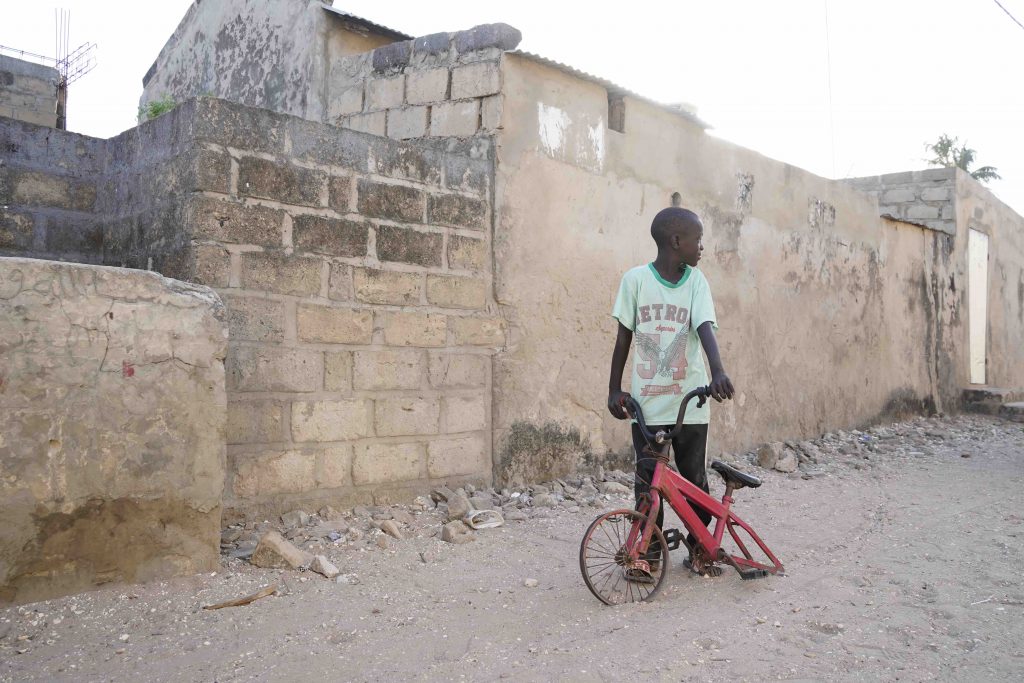
Senegal envelopes me
Smokey wind and sweet tea
On the beach there's a chicken, and children are kicking,
a football into the sea
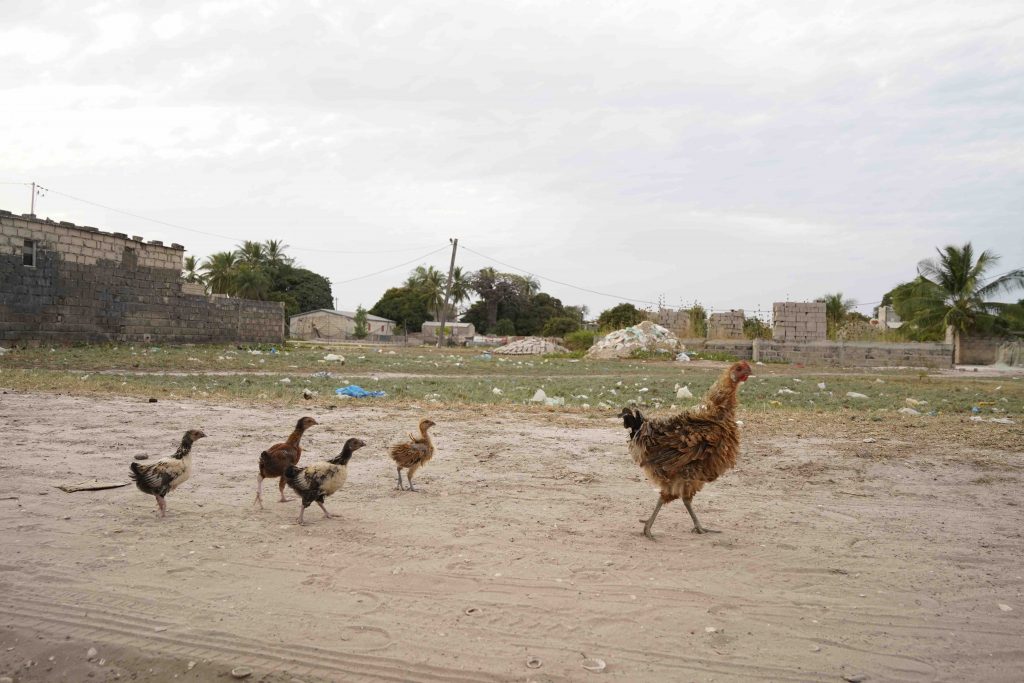
He was very upset one night because the previous evening someone had broken in and stolen his phone. I had an old smashed iphone se which I was more than happy to give him and did so the next day, only to find that Adama had also had his phone stolen. We had recently been sent some money for Christmas and had grown close to Adama. Feeling that he definitely needed it more than us, that evening we went to a second hand phone shop and found a modern pink Samsung that would do the job nicely. It was a weekend of many phones, since days before Niels had also fallen from the dingy onto the beach-very comically- and gotten it wet, but at this point it was still working..
There was going to be a reggae concert that Bouna was very excited about. He was also going to be performing, and when it rolled around we took the crowded bus together into Dakar, but not before Adama had stern words with us about keeping safe. I had the impression he didn’t trust the city, and worried about us a good deal.
There was no reggae concert. Bouna contemplated and told us that the funding must have just been pocketed as was often the case with ‘cultural’ events. “Senegal” he kept saying. It turned out to be his birthday of all days to be let down, and we decided to go out dancing with him somewhere Adama had mentioned. On the was back we ate big slices of watermelon from a vendor, and with a stroke of luck caught the last bus back to Ngor. Adamas room is lit by a UV purple light, and he had friends over. We drank frozen baobab juice and he put on is dancing shirt, a silky tunic with wide colourful stripes.
Niels and I couldn’t be sure if Adama suggested the place because we were European, or if he actually liked going himself, but it was a strange atmosphere. A €5 entrance fee, too expensive for locals, so pretty much only tourists milled around a fancy outdoor courtyard with a stage. It was some kind of Turkish techno and al the DJ’s had huge moustaches and seemed to enjoy their own music a bit too much. The others seemed to love it though and we did stay out until 3 am so it can’t have been that bad after all.
On the 22nd we left the little bay and our friends behind and sailed around the western tip of Dakar and towards the countryside. It was late when we left and navigating the big ship anchor field by night was nerve-wracking. Big fishing ships in rows appeared to be drifting slightly, and we were sailing fast so were on the alert. It was no fun in general sailing along the coast at night due to the hundreds of fishing buoys and lobster pots that were set even 15-20 miles out in the shallow waters. Not only this, but fishermen in pirogues without light would suddenly appear in front of us, or we would hear voices out on the ocean nearby without seeing where they were.
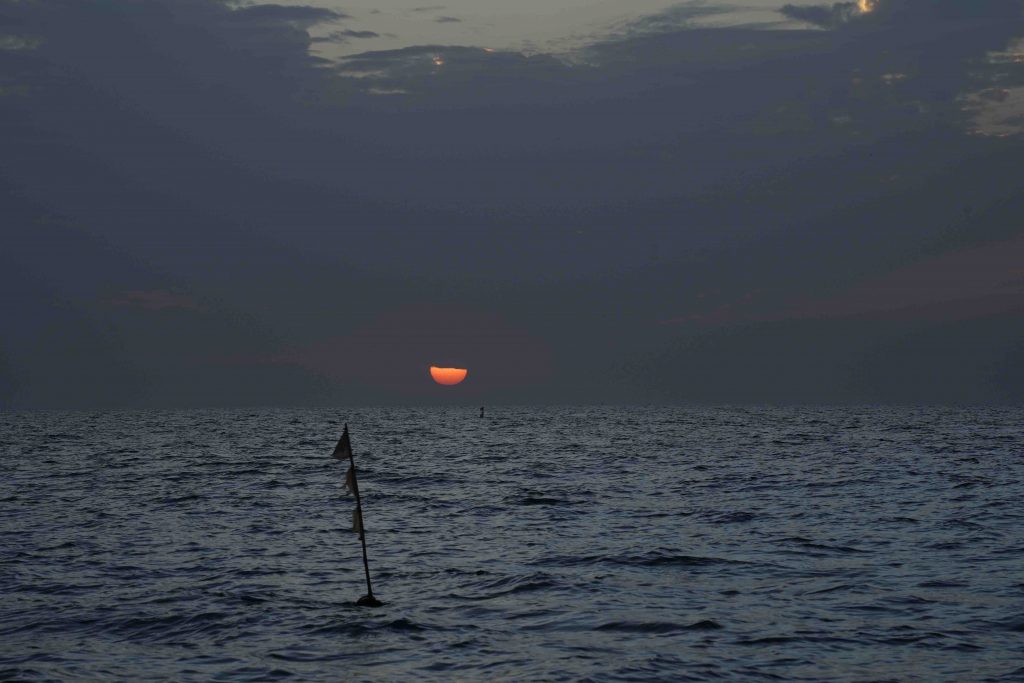
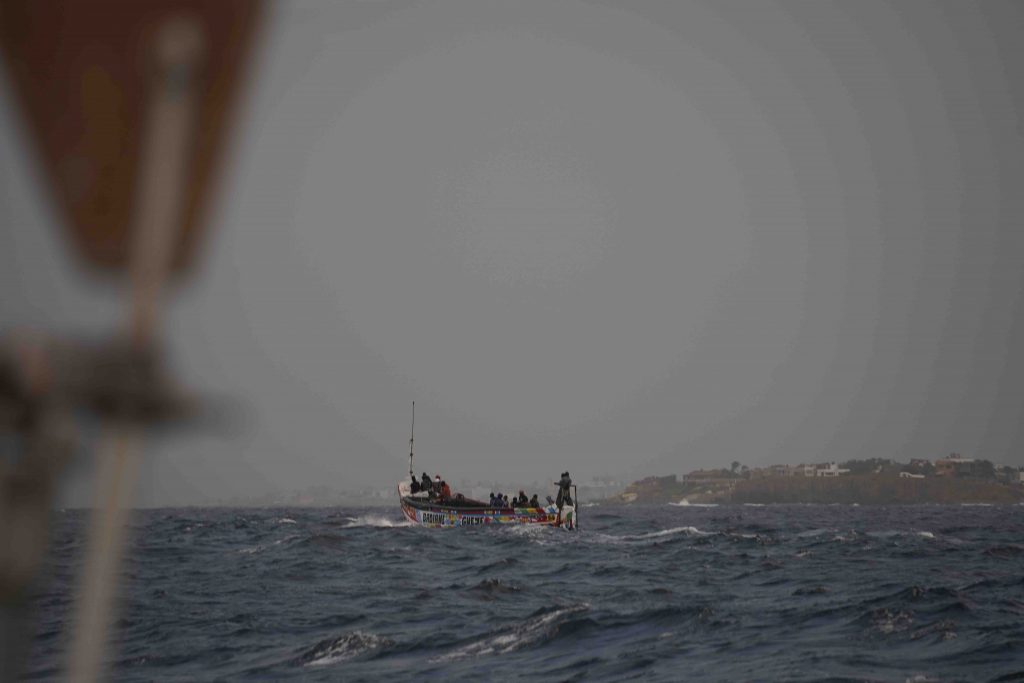
The next morning, we sailed alongside the others for the first time which was so much fun, trimming the sails and challenging ourselves to be faster than the other. We arrived a few hours later at the long beach by Popenguine where we would spend Christmas anchored together. Here we followed the sound of drumming through the streets to an open plain with children playing football in flipflops, and a dance workshop seemed to be happening. A street food stand caught our attention and we stood there eating sandwiches with curried peas and beans, and some deep-fried fishy things in newspaper which were so delicious it would be totally worth any potential food poisoning, and Tamara and I ordered more and more.
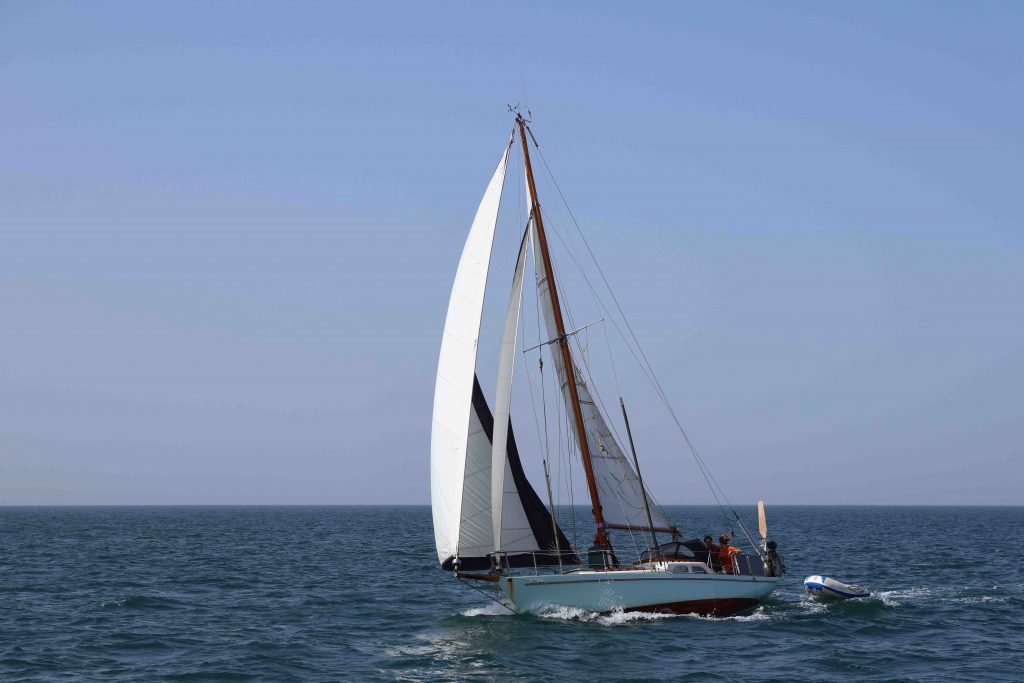
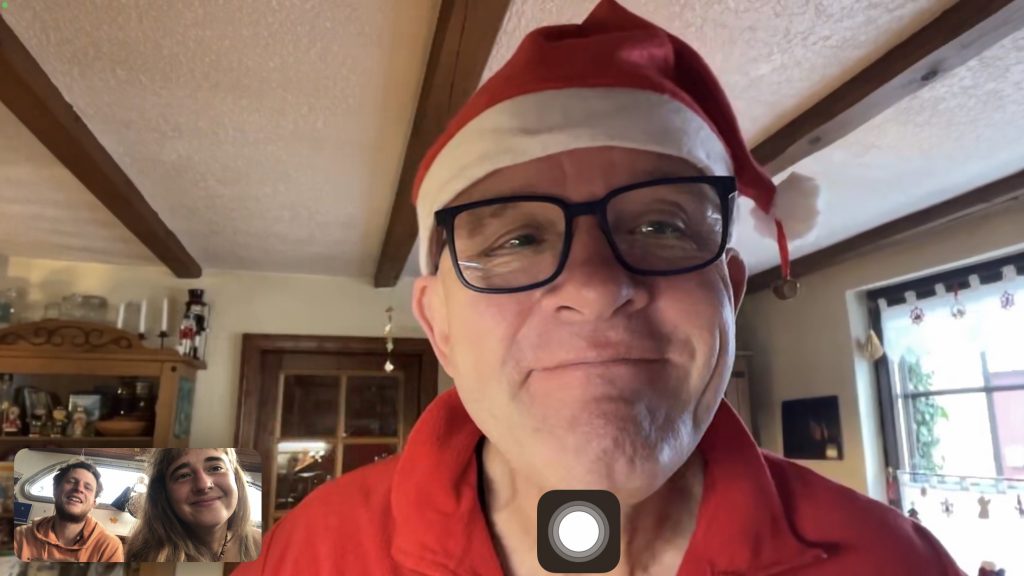
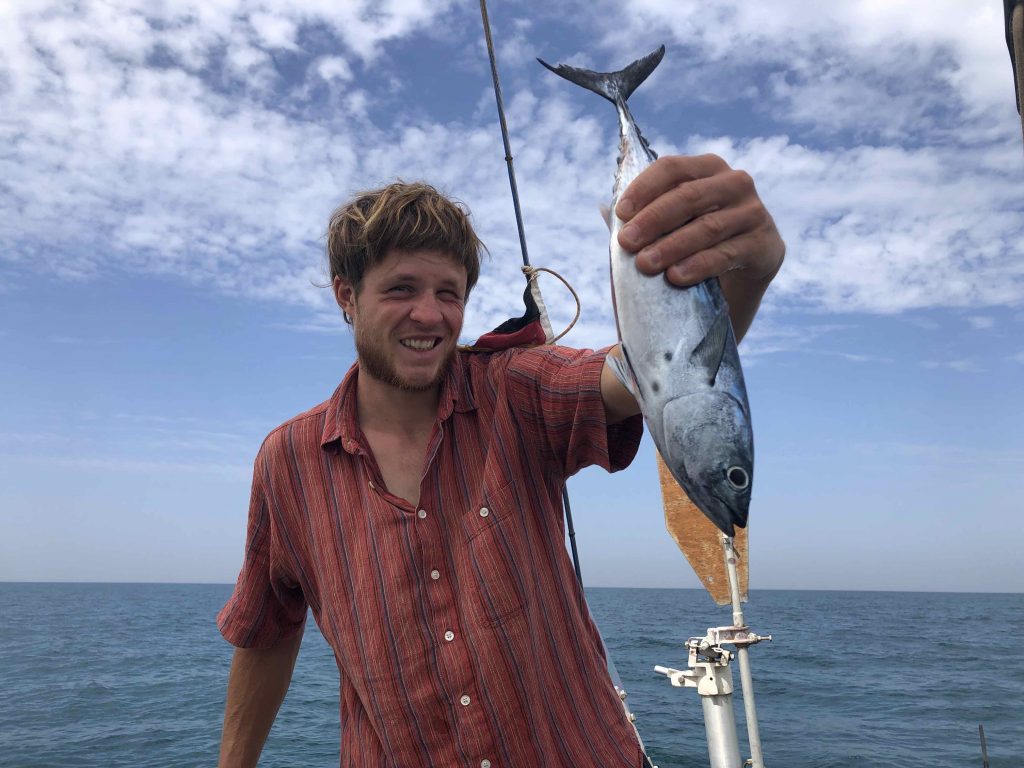
On the 24th– German Christmas- we had breakfast all together, Niels and Tamara went sailing with Atlanta to try and catch a fish, and I went with Otto and his brother to walk up and along the cliffs and see some of the land. It was dry and exciting, we found a dried salamander, black and white spotted feathers, a cotton plant and many old military platforms looking out to sea. That night we had no fish, but Otto’s mums traditional potato salad with veggie meatballs washed down with ‘caffee Flämmli‘ which kept us up late. The others left on the 25th to sail to the Cape Verde islands, and we had our own little Christmas on board and called our families back home.
On the 26th we continued our sail down the coast in amazing conditions and we caught a ‘little Tuney’ or Thonin. It’s a hunting fish related to tuna and it bit when we were going 7 knots and Niels was letting out the line which was still laying on the waters surface. I marinaded it in ginger and soy sauce and we fried it up. It was a gorgeous day, really calm and no waves. We’d just got the zoom out to record a song, when it seemed like there were suddenly allot of flies around. Hundreds in fact. On every surface, on our faces, in our eyes, and then there were wasps of all sizes and dragonflies and big butterflies. And something that bit horribly. The mast was a blur of wings. Everwhere buzzed at a different frequency. Niels armed with the electric fly swat was waving it around like a madman, little sparks and smoke following him as he went on the rampage. The wind completely died off so we couldn’t escape them, the whole cloud sloshed round us until we had enough, chucked out the anchor (10 miles out at sea, but only 13m deep) and hid indoors.
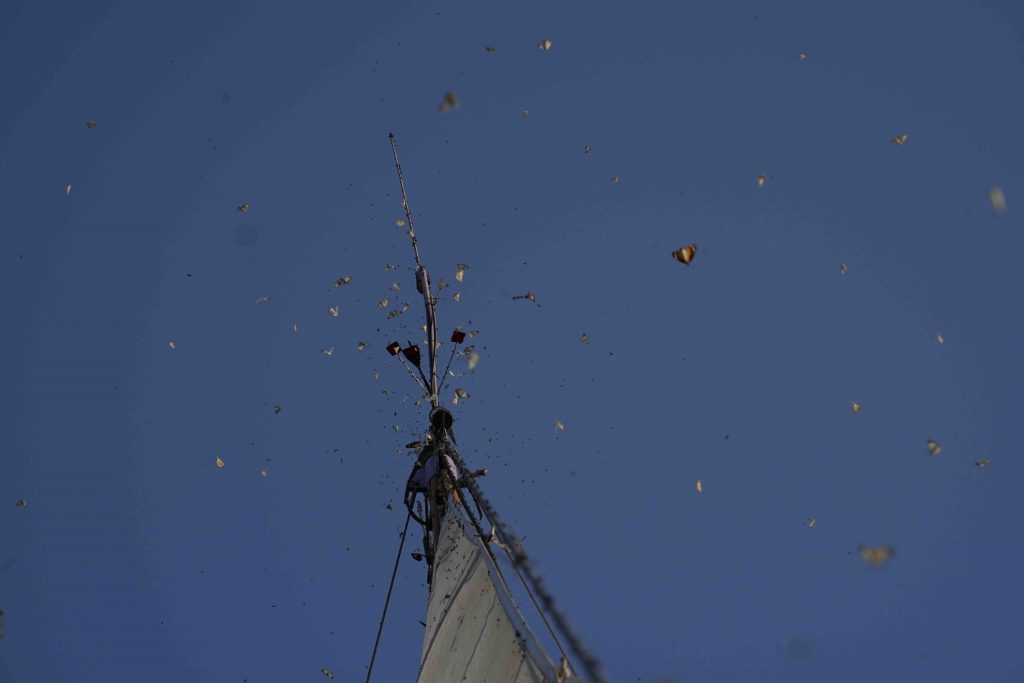
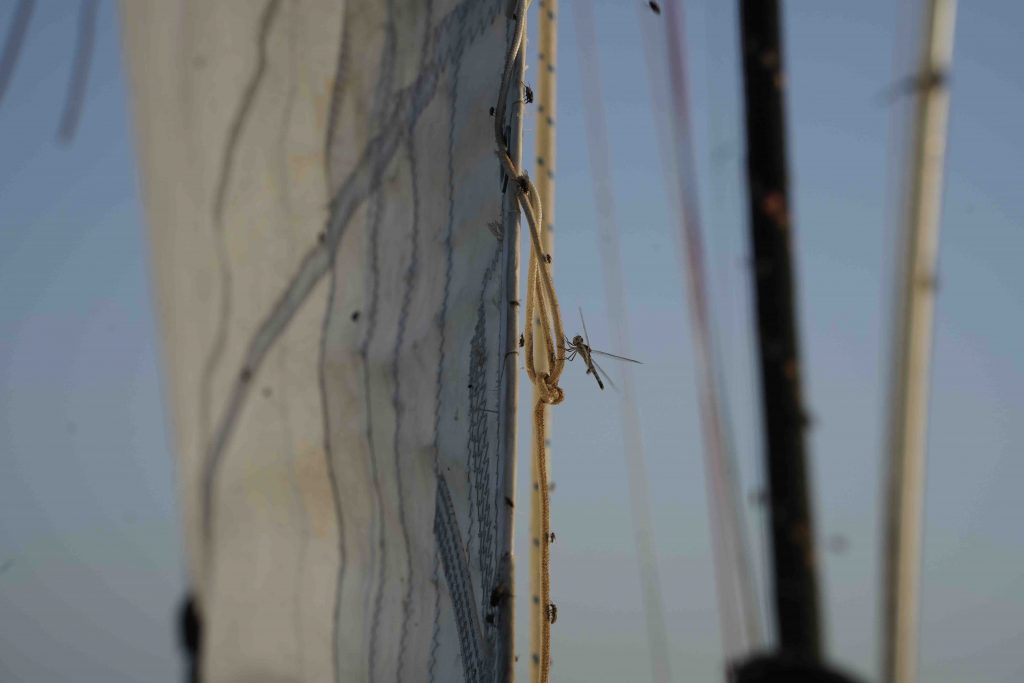
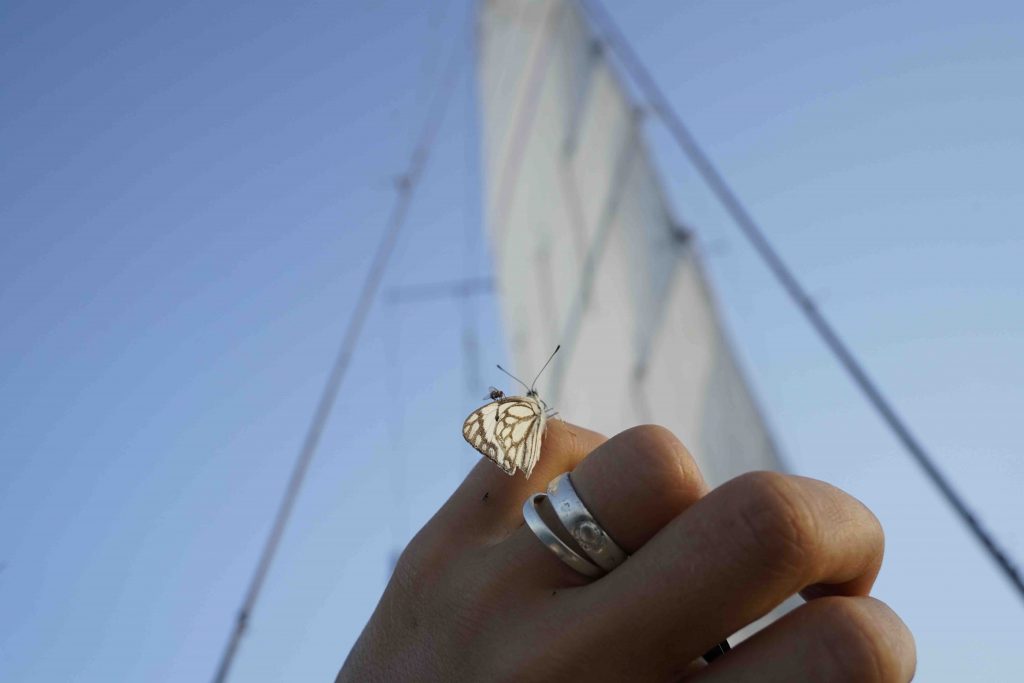
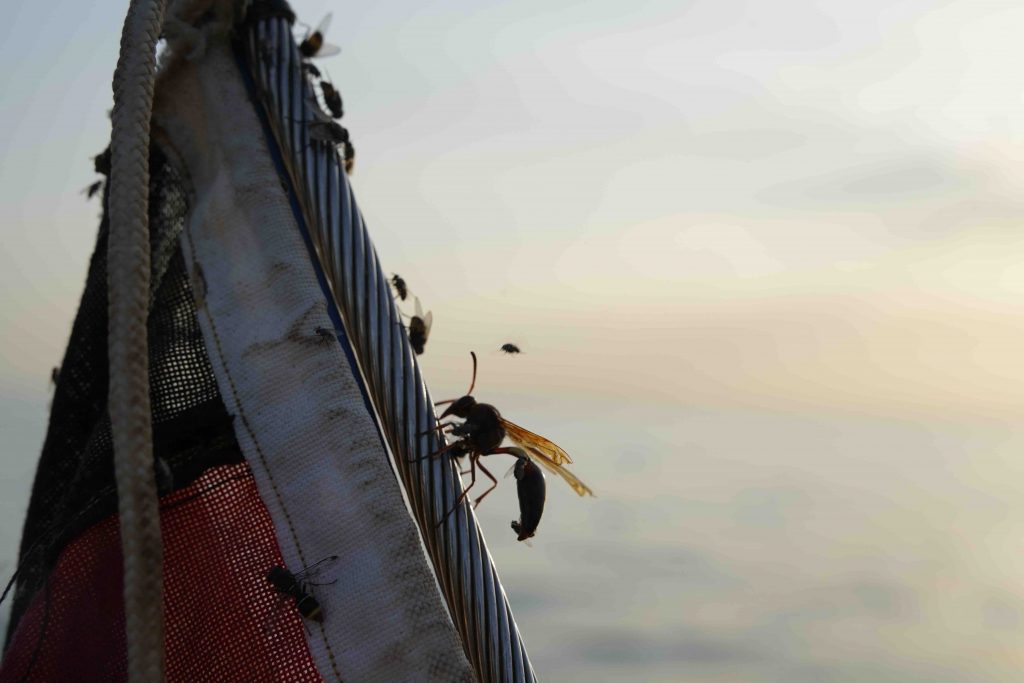
Around midnight the wind picked up, and the waves, and it the worst night sleep we’ve had since that ill fated anchorage on the Canary Islands when our anchor broke.
On the 27th we sailed to Saloum, a big river delta with a vast collection of islands. Just as we approached the shallow entrance carved out by sandbanks we got a call on the VHF from some French sailors who had anchored next to us for a few days in Ngor. They had just been sent away by the maritime police, there was a new legislation for boats entering the rivers that meant you had to go back to Dakar and pay €500 which allowed you to enter for 3 months. They weren’t sure if they had to pay or not, but any boat that was checked was sent to Dakar and tracked on the AIS until they arrived…
We turned our AIS off and decided to enter anyway and go into a smaller branch or the river instead of our original plan which would have had us drive straight up to the police boat. We were grateful for the information but it was worrying all the same, and made our stay a little more on edge.
It was pretty shallow as we entered, only around 3m, but you couldn’t see the bottom as it was very cloudy. We anchored opposite a small hotel with a wooden pontoon, but the water was so calm it was also easy to arrive on the beach. Colourful pirogues went up and down the green water, and there was smoke coming from somewhere on the beach. Big white cows roamed freely between the palm trees and it was incredibly beautiful. In case we were sent away in the morning by the police I wanted to go to land now so as not to miss our chance, but we needn’t have worried. We did only end up staying for 4 nights on the end but that was because it became clear that to check out of the country and sail to Cape Verde would be mightily complicated here in the countryside, and because of new year and bank holidays we could get quite stuck.
It was getting dark quickly when we got to land. Drumming drifted from the hotel and the jingle jangle of many bells got closer and closer until it was accompanied by hooves and a cart heavily laden with the hotel workers going back home for the night. A deep sandy track led to the village about 2k inland and we were careful not to tread on the many dung beetles dutifully clearing the paths for us. The first shop we came to sent a little boy with us to help find somewhere to exchange money. He was very sweet but confused and brought us to what he called ‘the boulangerie’. It was a women selling the best baguette we ate in Senegal, with beans and peas and some curried meats. Eventually we were directed to the ‘boss’ of the village, a big man with a lazy eye and a brother who lived in Germany and DROVE to Senegal once a year. With our money changed we went back to the boulangerie and got some dinner. That night as we paddled back the glowing algae was unreal, shimmering streaks lapping into one another like tiny green fireworks.
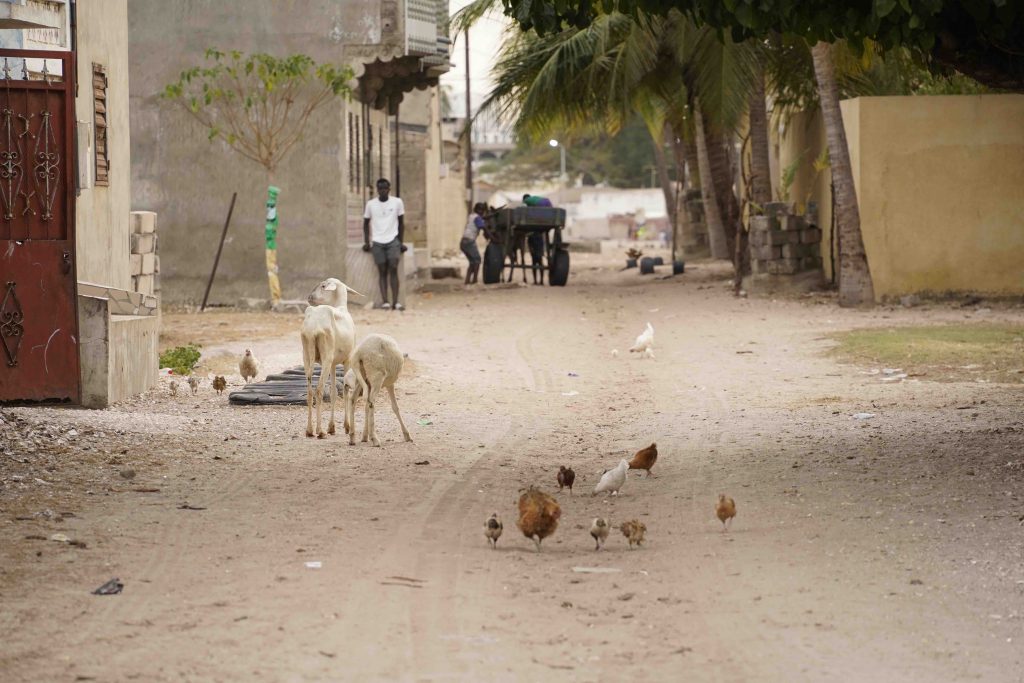
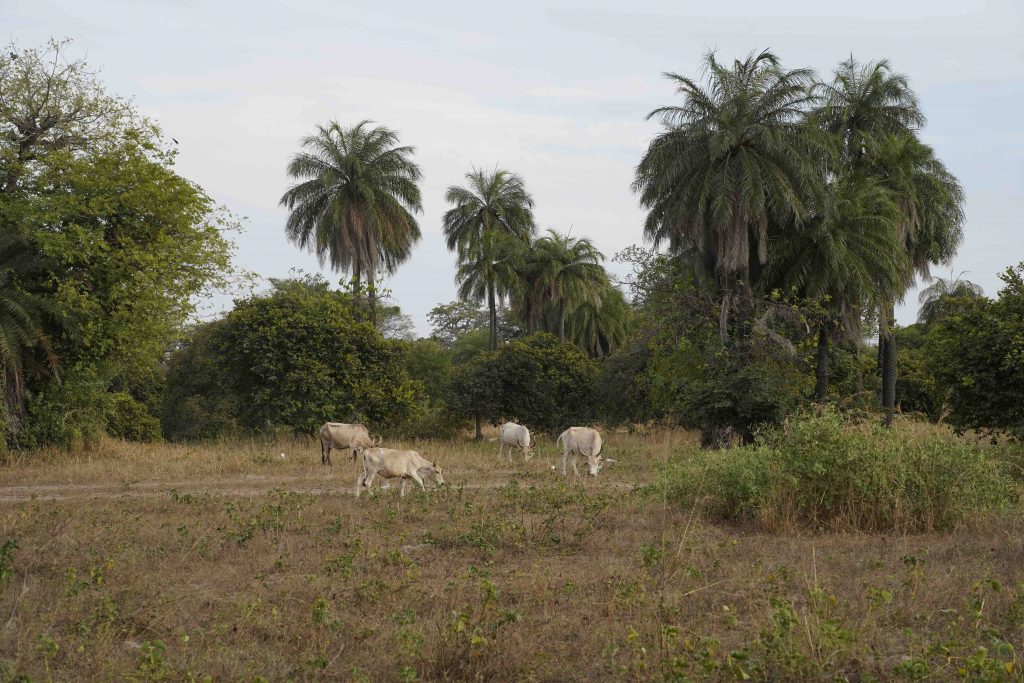
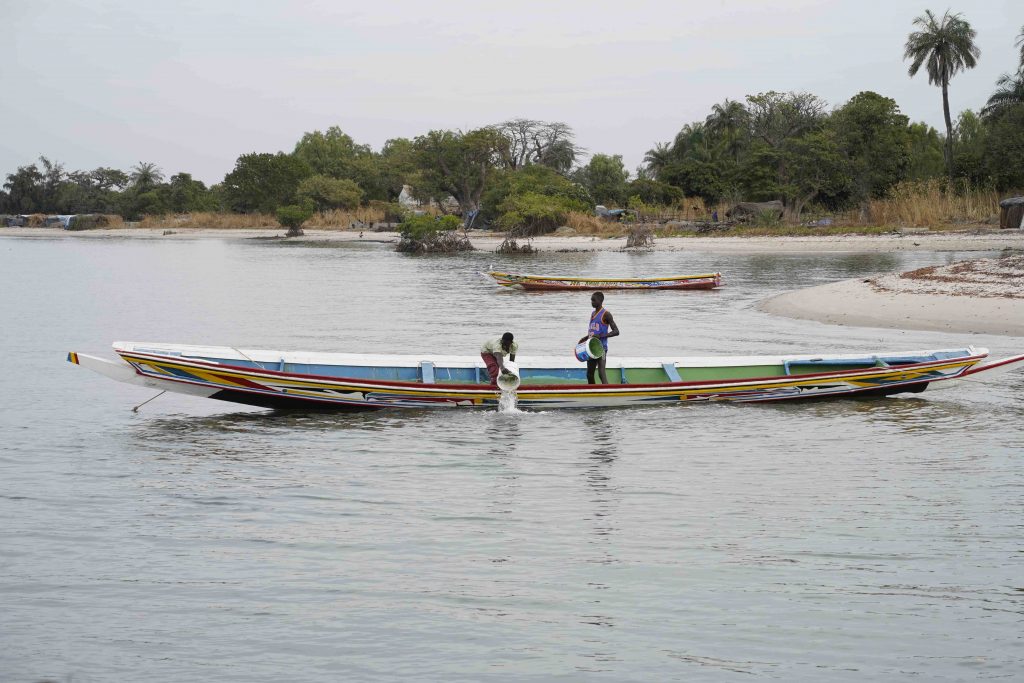
There are no cars on the island, only horses and donkeys tread the narrow sandy tracks. Sheep, goats, chickens and chicks roam through houses and streets and I wondered how they knew who’s was who’s. Maybe it didn’t matter. Everyone knew everyone and were somehow related to each other- ‘famille elastic’ they would say, and we were included in the phrase. Crowds of little boys and girls would shout and run after you giving high fives and teaching you their own handshakes. Many would also ask for gifts, even grown-ups would walk up and ask if we had a ‘cadau por moi?’
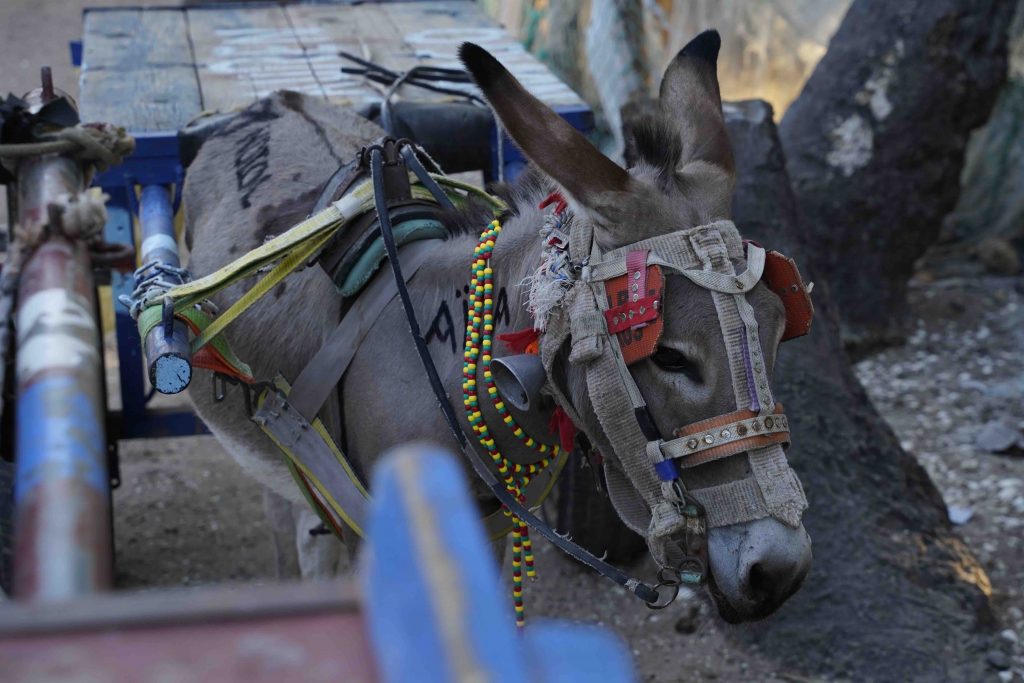
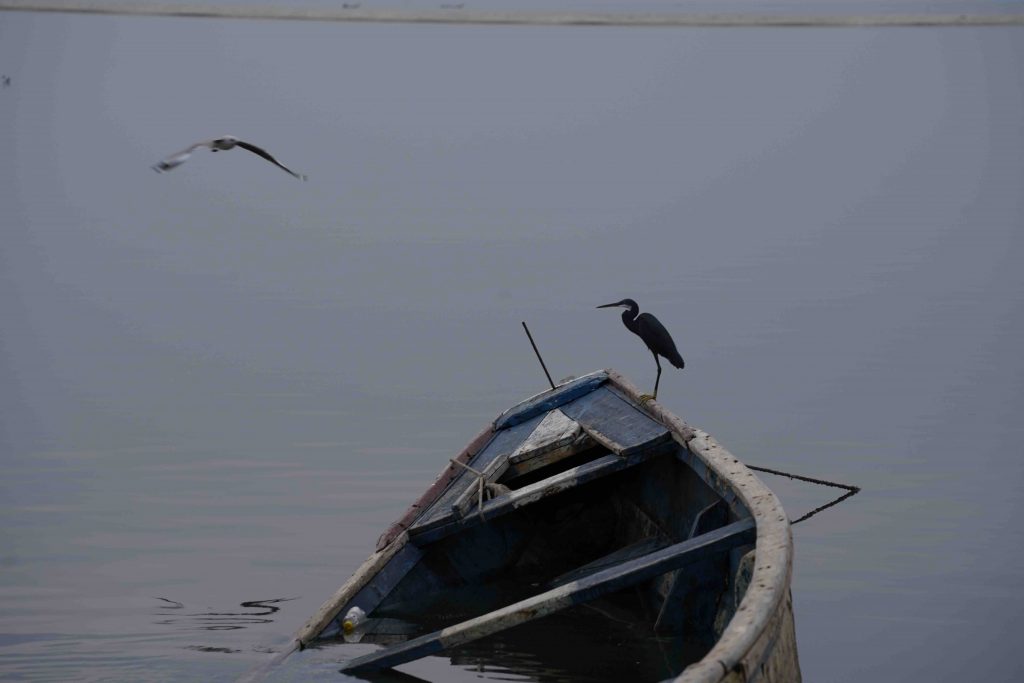
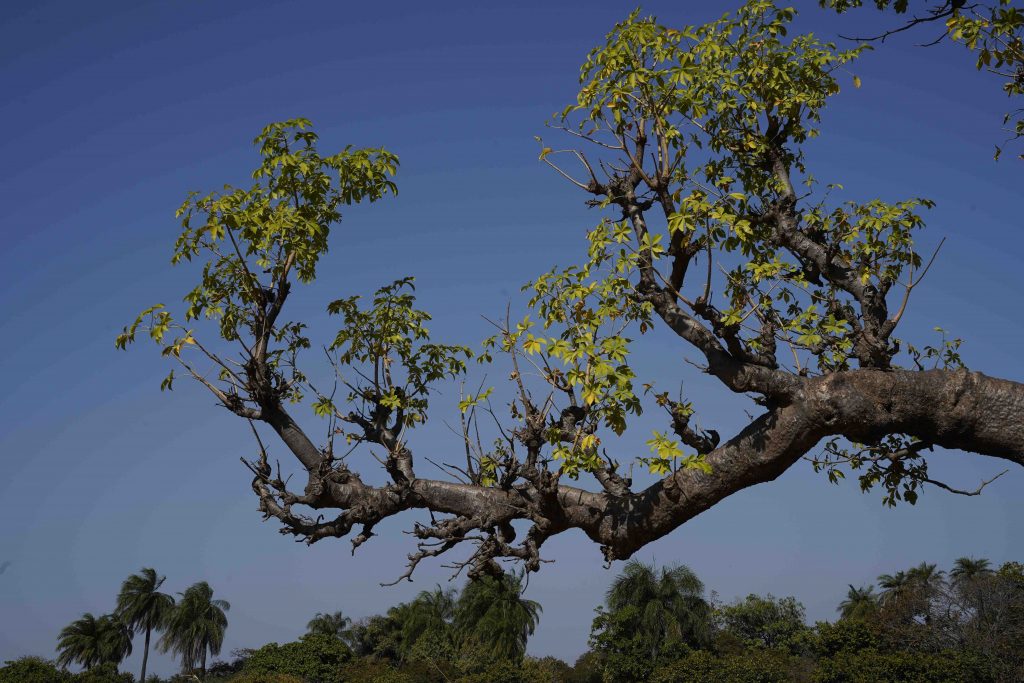
On the third day Niels had had enough of being harassed for gifts, and we went out into the mangroves. Big wide Baobab trees dotted the land with abstract furry fruits hanging high in the branches. Apparently it was often children who picked them, their small bodies balancing in the high branches thta stretch out far from the trunk. Along the beach there seemed to be secluded settlements of shacks draped with cloths and plastic and corrugated iron, and nearby were long low stone constructions for smoking fish. It was the Guineans the locals told us, they would come by boat and stay for a season fishing and smoking it, and then bring it back home. I wondered if his caused tension among the locals because they were taking ‘their’ fish, but they felt nothing of the sort. This could not be said for how they felt about the Chinese trawlers that had been sold fishing rights by the government in recent years, fishing the waters thoroughly and unsustainably leaving next to nothing for the people who lived from the sea.
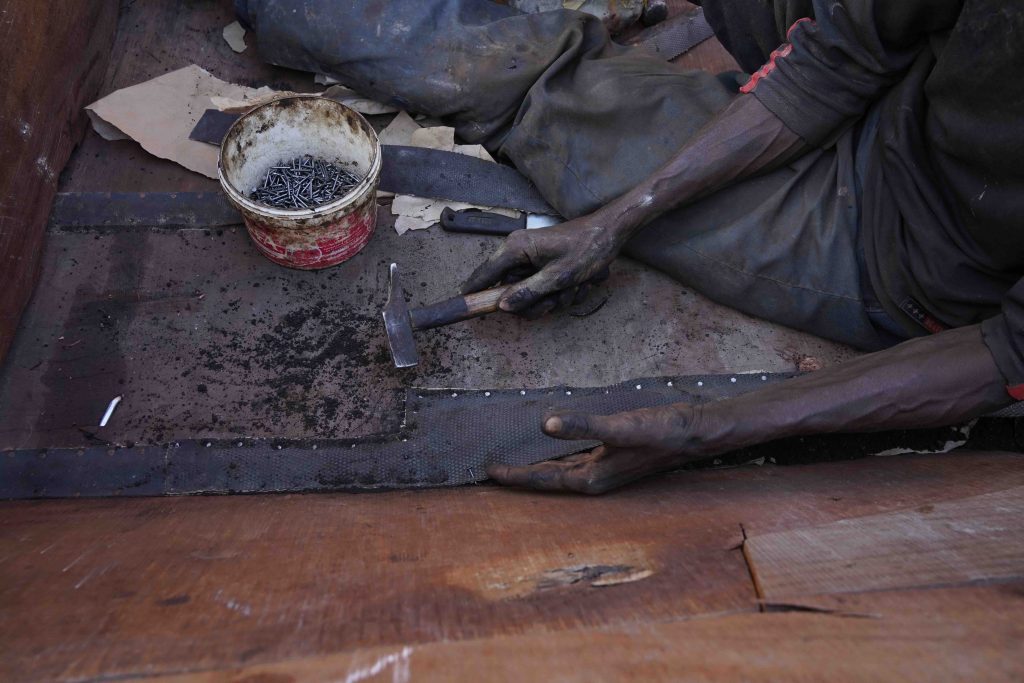
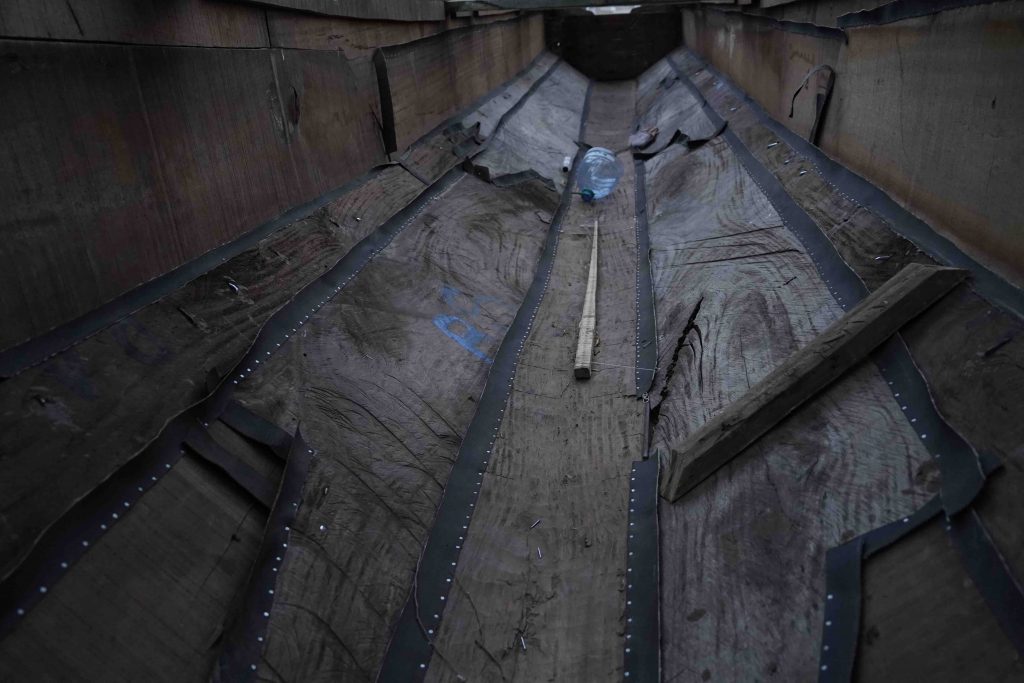
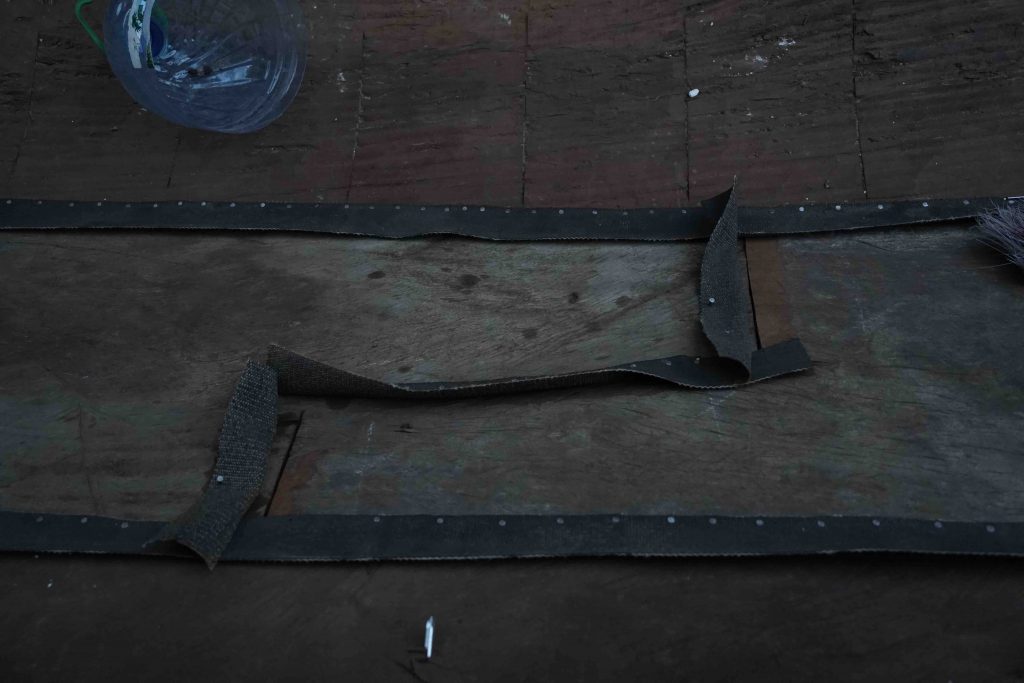
It was a boiling afternoon, and after drinking tea in the shade with ‘boss’ outside his shop we found a friend from the eveing before with a horse and cart to show us the other side of the island where they build pirogues from huge pices of redwood. There we met Saliou who was filling the cracks with a kind of powdered tar, hammering it compact and nailing a layer of strong fabric over the top. I asked how waterproof this was and he said it wasn’t. I suppose the wood swells when its on the river and closes it partially, and there’s always going to be a small amount of water coming in with wooden boats.
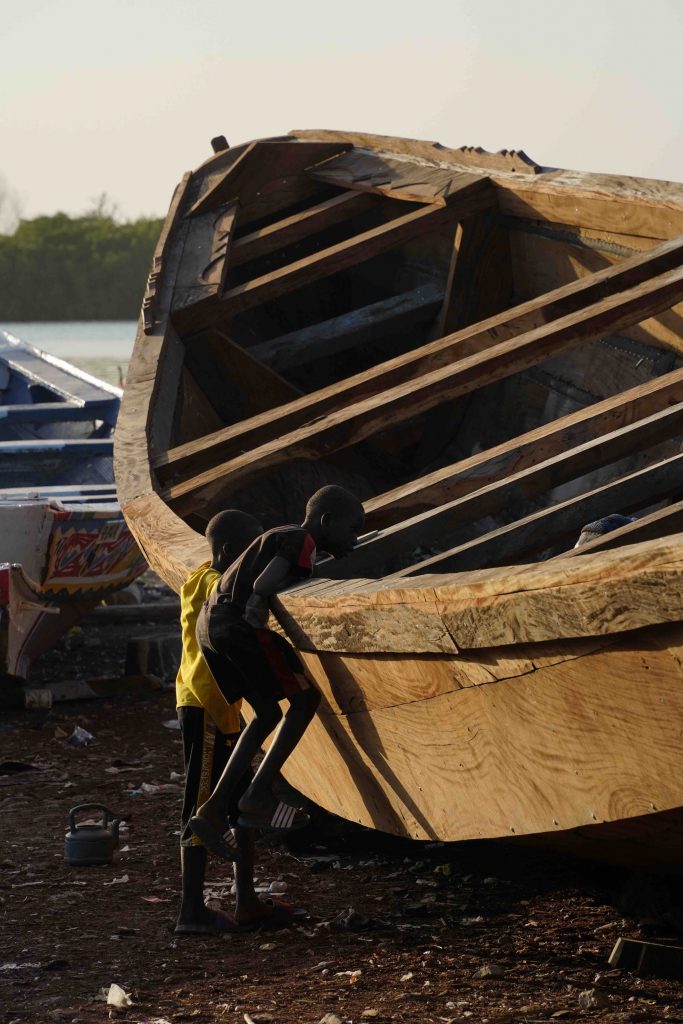
On our last night we walked our usual route along the beach past the abandoned hotels and palm trees that were gradually being eaten by the waves, to find that Security had prepared food for us and had been waiting.
Fish and rice!
We were almost always the only white people in the village. People were interested and we never felt unsafe, not once. Every night on our walk home, we would pass a little group of men drinking tea by a fire on the beach. This was the ‘Security Team’ entrusted to watch over the currently unoccupied houses and hotels, their owners most likely back in France. Armed with a strong headtorch, they would occasionally flash it around to make their presence known, but that seemed to be about it.
Not everyone spoke much French, but we seemed to get along all the same. I still get calls and voice messages from one of them almost daily, depite the lack of shared language. Fude would fish from the beach until 5am when his shift was over, and he would catch some massive fish in that shallow river, one was 9 kilos. A good thing too because he had 5 children at home, and he invited us to meet his youngest daughter who was only 3 weeks old.
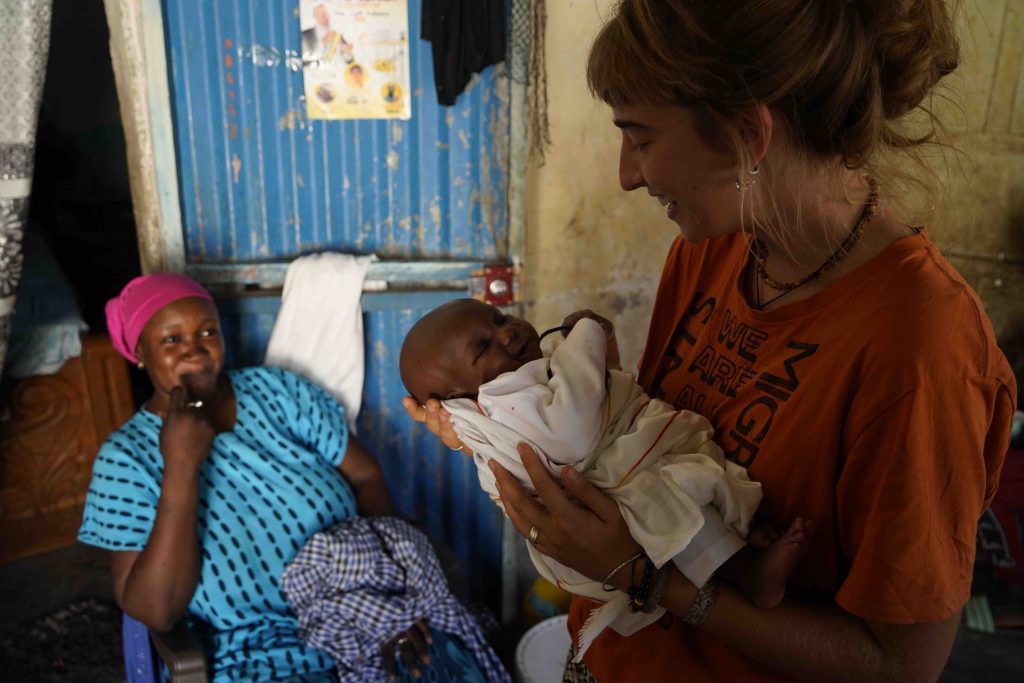
You could definitely tell it had been cooked by the men since there were no vegetables or spices, but it didn’t need them. It was so delicious and the others kept taking the best parts of the fish from the bones and pushing it onto our part of the plate. We all ate from one big plate of course, and with their hands, apart from a set of forks that were presented to us.
We left on the 30th and sailed through the night to Dakar to check out followed by a flock of birds circling the mast for hours lit an eery green by our position light, diving every now and then to fish.
The CVD is a big anchor field protected by the western land mass of Dakar. You pay €5 a night and can use the showers and toilets. There is also a rickety old landing pontoon and a shuttle dingy that takes you to and from your boat for free. You can tell that 30 years ago it could have been quite beautiful. Just up from the beach is a big courtyard shaded by tall green trees full of birds, and there are paved pathways and earthy patches with plants and low stone walls. A bar with stained plastic tables and chairs is mostly occupied by old French men, and some young people trying to hitch a lift to Cape Verde or over the Atlantic, also French. It had a colonial vibe and we didn’t hang around for long.
We checked out that morning and there was some confusion about some tax declaration which had Niels sent all over the place before it turned out he actually didn’t need to do anything. That night, new years eve, we went across town back to Ngor where Bouna was by chance in the car park… he was delighted and kept thanking god and looking up to the stars and laughing. It turned out he was going to perform tonight on a stage set up on the roundabout in the centre of town, and we had to come. Over christmas tim ethe roundabout had been lit up by an LED santa and sleigh- despite 90% of the population being Muslim and the funding could have definitely been more helpful elsewhere. We went to get Adama from his flat he shared with his mum and nephew ‘petit Adama’ and he gave us noodles and onion sauce from his auntie before heading back for the concert. Ngor was alive that night like we had never seen before. Every alley way full of families bustling around, every child who could hold onto a firework was holding one and pointing them at each other. They banged and whistled down the semi lit alleys and people ran screaming and laughing, but mostly screaming. We watched the madness from a bench by the roundabout drinking Café Touba, a spiced Senegalese coffee.
The concert consisted of some artists each playing one song, mostly dancing along and inviting children onstage. Bouna’s song was of course the highlight, but it seemed to be just a recording which he mouthed passionately along to. He was elated, and during the performance it struck midnight and the fireworks took a turn into warfare. Groups of teenagers from different football clubs were on roofes waving flags, chanting songs and throwing fireworks into the crowd, people started running for shelter and the bangs were getting louder. We all ran into the alleys and I was worried more about the stampede than the fireworks. After a while it calmed down, and Bouna took us to a club where Adama wanted to join us later, but it was so not our vibe, and again we questioned whether he actually liked it or just thought that all white people did…
We drank fresh ginger tea from a lady selling drinks in tiny paper cups from a big thermos, and decided to head back to Ngor where we found Adama in a little restaurant where he had organised some drumming for an enormous French guy who owned the place and spontaneously wanted some drummers at his party. It was a bizarre atmosphere but the live music was great, and we all danced in gold party hats to celebrate the new year. It was a hard goodbye, and they waited with us until we took a taxi home at 3am and were lucky enough that the night watch at the CVD let us back to our dingy as the gates had already been locked.
It took until the 2nd of January to be ready to sail again, leaving by daylight meant we could actually see the many big ships on anchor which was nice. It was definitely hard to leave, especially since Senegal had welcomed us with open arms unlike any of the other countries we’d visited on the whole journey, but to stay would have meant staying for the hottest part of summer, and sailing back to the Canary islands, and over the Azores back to Europe because of the trade winds, which is a massive detour. It’s more of an adventure to go across the Atlantic and being stationary in one country on our boat makes it feel even smaller because we would spend more time onboard.
So off we went and the decision to cross was now clearly made.

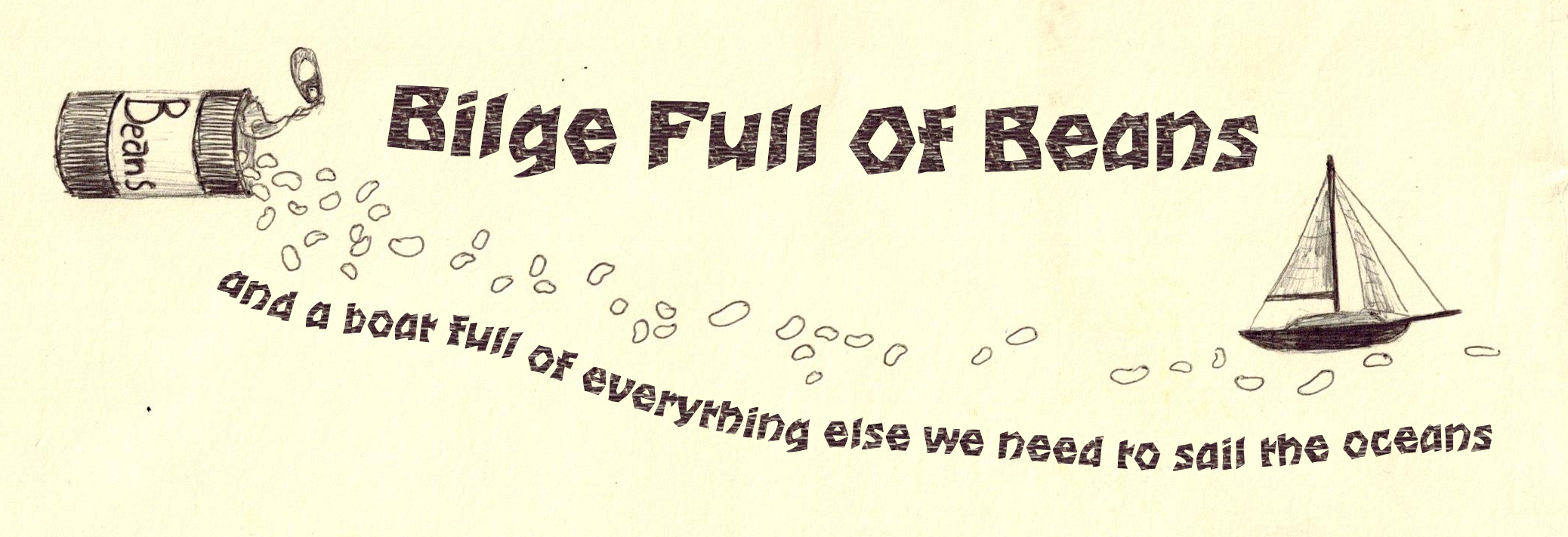
Leave a Reply